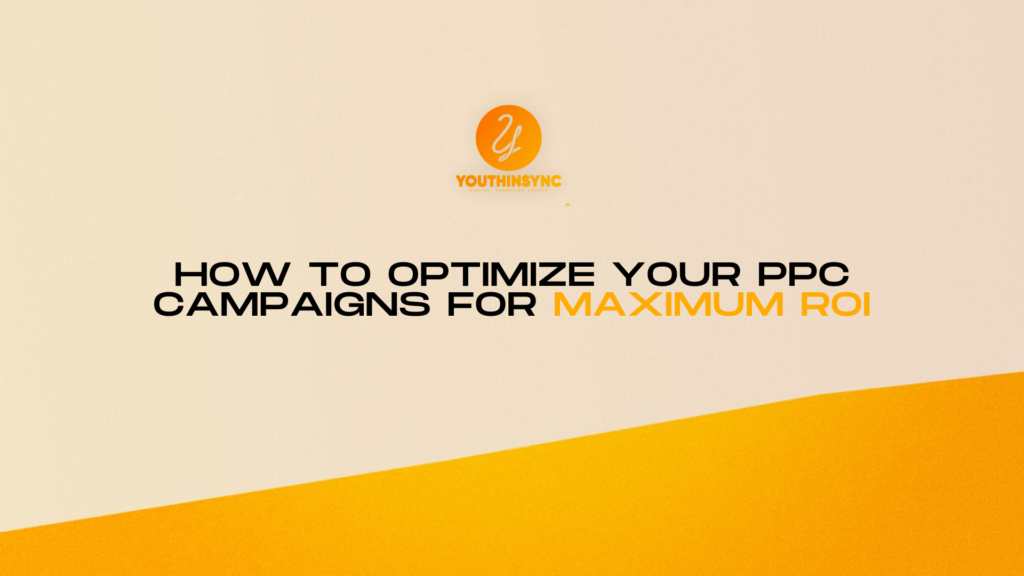How to Optimize Your PPC Campaigns for Maximum ROI
Introduction to PPC Optimization Optimizing your PPC (Pay-Per-Click) campaigns requires continuous analysis, strategic planning, and real-time adjustments to ensure your ads are both effective and cost-efficient. By mastering the fundamentals of PPC and understanding how to measure ROI, you can set your campaigns up for success from the start. Understanding PPC Campaigns and ROI What is PPC Advertising? PPC advertising is an online model where advertisers pay a fee each time one of their ads is clicked. Rather than earning visits organically, PPC allows businesses to purchase targeted traffic. Common platforms for PPC include Google Ads, Bing Ads, and social media networks like Facebook and LinkedIn. The Importance of ROI in PPC ROI (Return on Investment) measures the profitability of your PPC campaigns. It’s calculated by dividing the net profit from the campaign by its total cost. A high ROI indicates that your campaigns are effective, delivering more value than what you spend. Key Metrics to Track To optimize your PPC campaigns for maximum ROI, you need to track these key metrics: Cost Per Click (CPC): The average amount you pay for each click. Click-Through Rate (CTR): The percentage of people who click on your ad after viewing it. Conversion Rate: The percentage of clicks that result in a desired action (e.g., purchase, sign-up). Quality Score: Google’s rating of your keywords’ relevance and ad quality. Impression Share: The percentage of impressions your ads receive compared to the total available impressions. Setting Clear Goals and Objectives Defining Your PPC Goals Clear goals are essential for measuring your PPC campaigns’ success. Common objectives include increasing website traffic, generating leads, boosting sales, and raising brand awareness. SMART Goals for PPC Campaigns Ensure your PPC goals are SMART: Specific, Measurable, Achievable, Relevant, and Time-bound. For example, instead of setting a vague goal like “increase traffic,” aim for “increase website traffic by 15% within three months.” Conducting Comprehensive Keyword Research The Role of Keywords in PPC Keywords are the backbone of PPC campaigns, determining when and where your ads appear. Effective keyword research ensures your ads reach the right audience. Tools and Techniques for Keyword Research Use tools like Google Keyword Planner, SEMrush, and Ahrefs to identify high-performing keywords. Focus on keywords with high search volume and low competition to get the best results. Crafting Compelling Ad Copy The Elements of Effective Ad Copy Your ad copy plays a crucial role in attracting clicks and driving conversions. It should include a compelling headline, clear messaging, and a strong call to action (CTA). Writing for Your Audience Understand your audience’s needs and pain points, and tailor your ad copy to address these directly. Use language that resonates with your target audience to increase engagement. A/B Testing Ad Copy A/B testing involves running two ad versions to determine which performs better. Experiment with different headlines, descriptions, and CTAs to optimize for clicks and conversions. Optimizing Landing Pages The Importance of Relevant Landing Pages An optimized landing page is key to converting clicks into customers. Ensure your landing page aligns with your ad copy and offers a seamless user experience. Designing for Conversions Design your landing pages with conversion goals in mind. Use clear headlines, persuasive content, and strong CTAs. Ensure the page is mobile-friendly and loads quickly to reduce bounce rates. Implementing Effective Bid Strategies Manual vs. Automated Bidding Manual bidding gives you more control over your spending, but it’s time-consuming. Automated bidding leverages algorithms to optimize bids based on your goals, saving time and enhancing performance. Bid Adjustments for Different Devices and Locations Adjust bids based on performance across different devices and locations. Increase bids where conversions are high and decrease them where performance is weaker. Budget Allocation and Management Allocate your budget based on campaign performance. Prioritize spending on high-performing keywords and ads to maximize ROI. Utilizing Advanced Targeting Options Demographic Targeting Use demographic targeting to reach specific audiences based on factors like age, gender, and income. Tailor your ads to resonate with different groups. Geo-Targeting and Ad Scheduling Geo-targeting lets you display ads in specific locations, while ad scheduling helps you run ads when your target audience is most active. Both tactics can improve relevance and effectiveness. Remarketing and Custom Audiences Remarketing targets users who previously interacted with your site, while custom audiences allow you to target specific user groups based on their behavior and interests. Both strategies boost conversion rates. Monitoring and Analyzing Campaign Performance Setting Up Proper Tracking Use tools like Google Analytics and Google Ads conversion tracking to monitor campaign performance. Proper tracking helps you understand user interactions with your ads and landing pages. Analyzing Key Performance Indicators (KPIs) Regularly review KPIs such as CTR, conversion rate, and ROI. Look for patterns and identify areas for improvement to refine your strategy. Adjusting Campaigns Based on Data Insights Leverage data insights to make informed adjustments. Optimize bids, tweak ad copy, and improve landing pages to enhance performance. Leveraging Ad Extensions and Formats Types of Ad Extensions Ad extensions add extra information and links to your ads. Common extensions include site link extensions, callout extensions, and structured snippets. Using Ad Extensions to Enhance Visibility Ad extensions make your ads more prominent and increase the likelihood of clicks and conversions by offering additional details. Choosing the Right Ad Formats Select the ad formats that align with your goals, whether it’s text ads, display ads, video ads, or shopping ads. Each format has unique strengths and caters to different audiences. Staying Updated with PPC Trends and Best Practices The Ever-Changing Landscape of PPC The PPC landscape evolves continuously, with new features, tools, and strategies. Staying updated on trends keeps your campaigns competitive. Continuing Education and Training Invest in ongoing education by attending webinars, reading industry blogs, and taking courses. This keeps you informed about the latest PPC techniques. Learning from Industry Leaders and Case Studies Follow industry leaders and study case studies to gain insights and apply successful strategies in your own campaigns. Learning from proven methods can enhance your results. Avoiding Common PPC
How to Optimize Your PPC Campaigns for Maximum ROI Read More »

